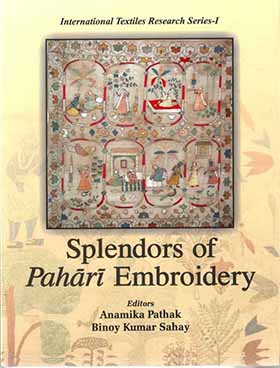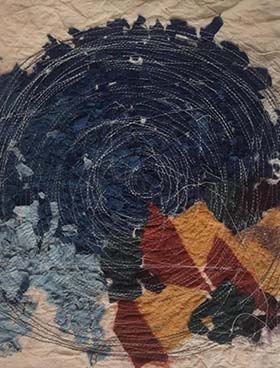ABSTRACT
Embroidery is an ancient form of needlecraft that has been used globally to embellish textiles for ornamental and communicative purposes. Embroidery as a form of surface ornamentation is the most cliché form of understanding the craft. Enough evidences have proven the conception of embroidery, its motifs, designs and patterns to be associated with many meanings and many purposes interwoven on the fabric. Phulkari is one such embroidered textile from Punjab that holds embroidered aspirations of Punjabi women. This embroidery was done on cotton khaddar with un-twisted silk floss in vibrant colours. The use of baghs and phulkaris amongst Punjabis on various traditional occasions and rituals has been widely discussed by scholars. The main aim of this paper is to discuss the motifs and patterns and its exemplification through a comparative analysis of motif vocabulary of sainchi and connecting it with the ideologies of Punjabi women of 19th century. Sainchi phulkaris were the posters with the pictorial narration of times gone by and connotations of inspirations to lead life. It was the only bagh with figurative motifs unlike many other types of baghs. For the present study data was collected by visiting National Handicraft and Handloom Museum and studying and documenting the artefacts in its collection. Through comparative analysis and observation method it was concluded that the women embroiderers had similar ideologies as they were fostered since childhood. The choice of motifs and its placements were analogous, the colours were perceptively used, and the technique of stitches was different as seen in other baghs. It was also observed that an array of motifs was embroidered inspired from daily life as well as mythological stories and embroiderer’s own aspirations. Many sainchis were observed to be embroidered with motifs that narrative stories of social events happening around that time. This paper is an attempt of researcher to celebrate the Punjabi women who were also designers or their own dreams.
Keywords: Sainchi, Phulkari, Punjab, Indian Embroidery
ABOUT AUTHOR
MS. GURVINDER KAUR GUNDEV
PhD Scholar, Department of Clothing and Textiles, Faculty of Family and Community Sciences, The Maharaja Sayajirao University of Baroda, Vadodara
Ms. Gurvinder Kaur Gundev is Sr. Archivist working with Tarun Tahiliani Designs. She is a NET qualified and is an alumna from SNDT Women’s University, Pune and The Maharaja Sayajirao University of Baroda. She has pursued her graduation in Textile Science and Apparel Design and her Post Graduation in Clothing and Textiles. She is also pursuing Ph. D from The Maharaja Sayajirao University of Baroda, Vadodara. She is an Empanelled Designer by Development Commissioner Handicrafts, Ministry of Textiles, Government of India. She has an experience of 9 years in Academics and Research. She has presented and published research papers and research posters at various National and International Conferences and Workshops. She has been on the panel as Design Expert to train artisans for New India Artisan Fellowship Program initiated by Fair Trade Forum India. She has also authored and reviewed field relevant textbooks for vocational courses along with PSSCIVE, Bhopal NCERT. She has her expertise in Indian Traditional Textiles, Craft Documentation, Product/Collection/Design Development, Clothing and Construction, Fabric and Yarn Crafts, Surface Ornamentation Techniques and Textile Testing.
DR. ANJALI KAROLIA
Dean, Faculty of Family and Community Sciences, The Maharaja Sayajirao University of Baroda, Vadodara.
Prof. (Dr) Anjali Karolia, Dean Faculty of Family and Community Sciences, and Director, Institute of Fashion Technology, The Maharaja Sayajirao University of Baroda, Vadodara. She has over 38 years of research and teaching experience and has received a total of 8 fellowships including the Fulbright-Nehru Visiting Lecturer fellowship and awards during her illustrious career. She was a founder member in setting up of the Institute of Fashion Technology at the Maharaja Sayajirao University of Baroda and worked with the department to develop the curriculum and infrastructure for three degree programmes, several post graduate diplomas and certificate programmes. She has also authored a two volume book on ‘Indian Handcrafted Textiles of India’ published by Niyogi Books New Delhi. She has over 75 research papers published in International and National research journal of repute to her credit. She has travelled widely and delivered a number of talks and presented a number of papers and held exhibitions in different forums, departments and museums in India and abroad, on Dyeing and Printing, Value addition and Product Diversification and Traditional textiles and costumes. She has been on the Board of Studies, Research committees and Advisory boards of a number of Universities and also on the review panel for evaluation of applications for various programmes/fellowships/ scholarships and grants.


